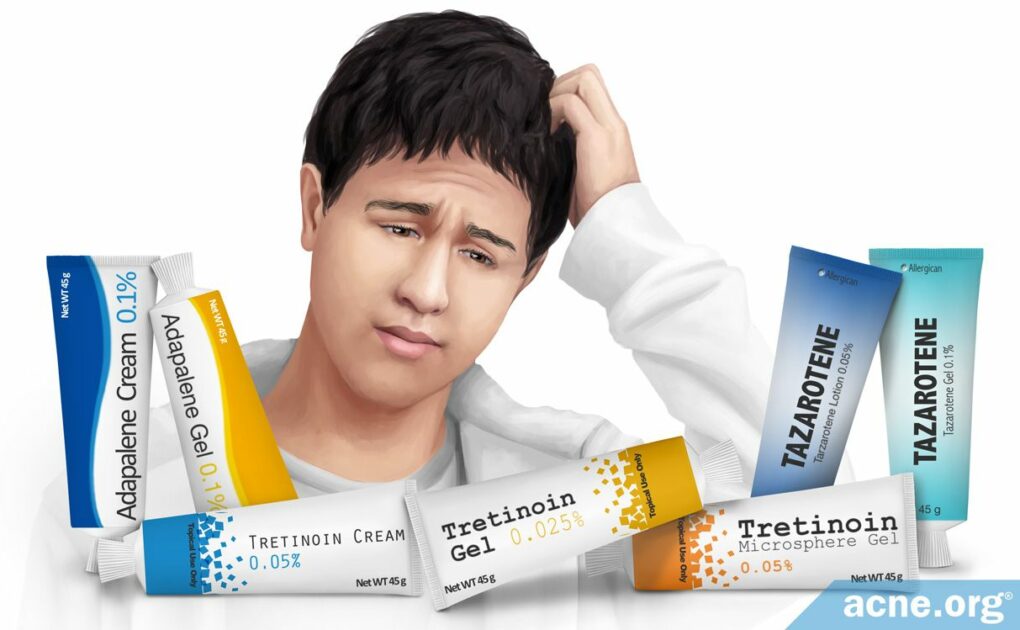Retinoids Are Vitamin A Derivatives That Are Applied Topically and Can Help Reduce Acne

The Essential Info
Retinoids are commonly-prescribed topical medications that help unclog pores and reduce inflammation. The FDA has approved four topical retinoids:
- Tretinoin
- Adapalene [0.1% is now also available over-the-counter]
- Tazarotene
- Trifarotene, which was recently released in 2019
Which Works Best: Which retinoid works best is still up for debate because researchers have still not tested all four of them head-to-head, but if we had to take an educated guess based on the available data, tazarotene may come out ever-so-slightly on top. However, we do know that no topical retinoid will completely clear the skin on its own. They are therefore often combined with other medications, especially benzoyl peroxide.
Side Effects: Skin irritation is expected for the first few weeks of use and subsides with continued use. Adapalene appears to produce the least irritation and tazarotene appears to produce the most.
My Personal Experience: I have tried three retinoids in the past (tretinoin, adapalene, and tazarotene), and in my personal, admittedly anecdotal experience, none of them worked very well. This is not to say they don’t help some people however, and data says they can indeed reduce acne to some degree. As far as irritation goes, tazarotene was almost intolerable, producing massive amounts of skin irritation, whereas the other two weren’t bad at all.

The Science
Topical retinoids are vitamin A derivatives that doctors can prescribe to treat mild-to-moderate acne. The Food and Drug Administration (FDA) has approved four topical retinoids for the treatment of chronic skin conditions, including acne. Those 4 are:
- Tretinoin
- Adapalene [0.1% adapalene is now available over-the-counter]
- Tazarotene
- Trifarotene
All four interact with skin cells in slightly different ways, but ultimately they all work to reduce acne by unclogging pores and reducing inflammation.1-5 Doctors can prescribe each of the retinoids in a variety of concentrations and vehicles (creams, gels, or lotions) that affect how the retinoid works within the skin and how well it is tolerated. Doctors can also prescribe a retinoid in combination with other acne-fighting medications, such as benzoyl peroxide.6
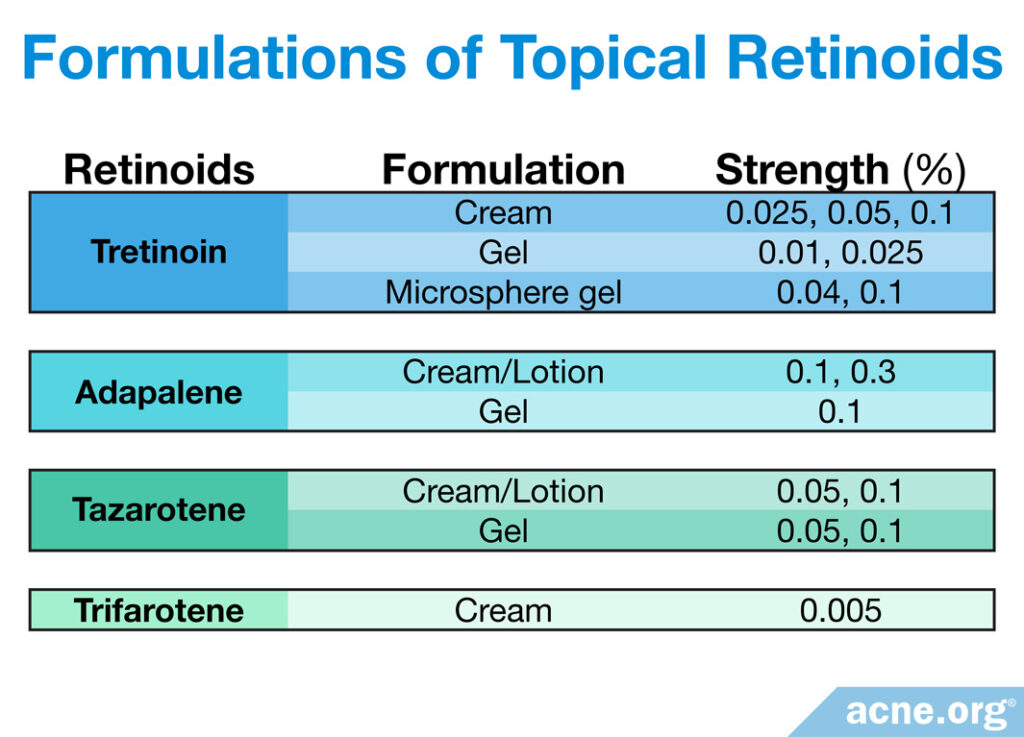
Retinoid Effectiveness Against Acne
Studies investigating the effectiveness of topical retinoids have demonstrated similar efficacies in the treatment of acne.7 Although a few studies have shown tazarotene to be slightly more efficacious than adapalene, “all topical retinoids are effective in reducing the number of comedones and inflammatory lesions by about 40% to 70%.”2,7
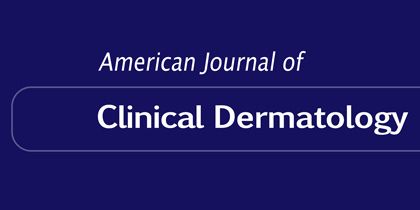
A systematic review published in the American Journal of Clinical Dermatology in 2019 combed through 54 clinical trials conducted on topical retinoids over the previous 10 years. The review authors concluded that the three topical retinoids available at the time (tretinoin, adapalene, and tazarotene) were about equally effective, but adapalene may have had the mildest side effects. They wrote, “The differences in efficacy of topical retinoids appear minor…Adapalene has a superior tolerability profile amongst topical retinoids.”8
Tretinoin
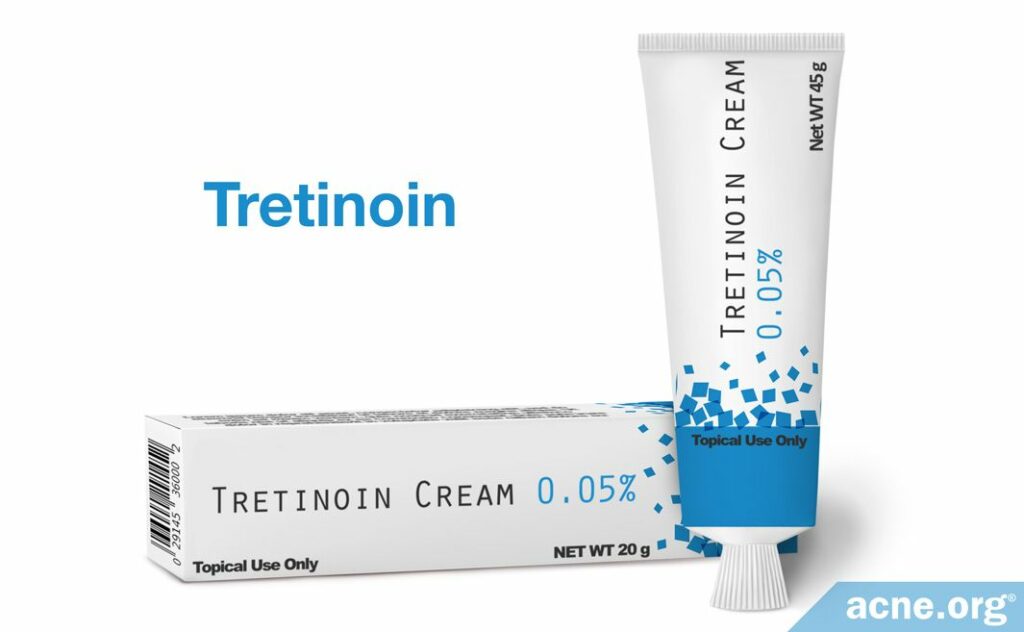
Studies have shown that when patients apply tretinoin nightly for a period of 12 weeks, it results in an average reduction of 17 – 71% of non-inflammatory lesions, a 33 – 81% reduction of inflammatory lesions, and a 22 – 83% reduction in overall lesion counts.2
Adapalene
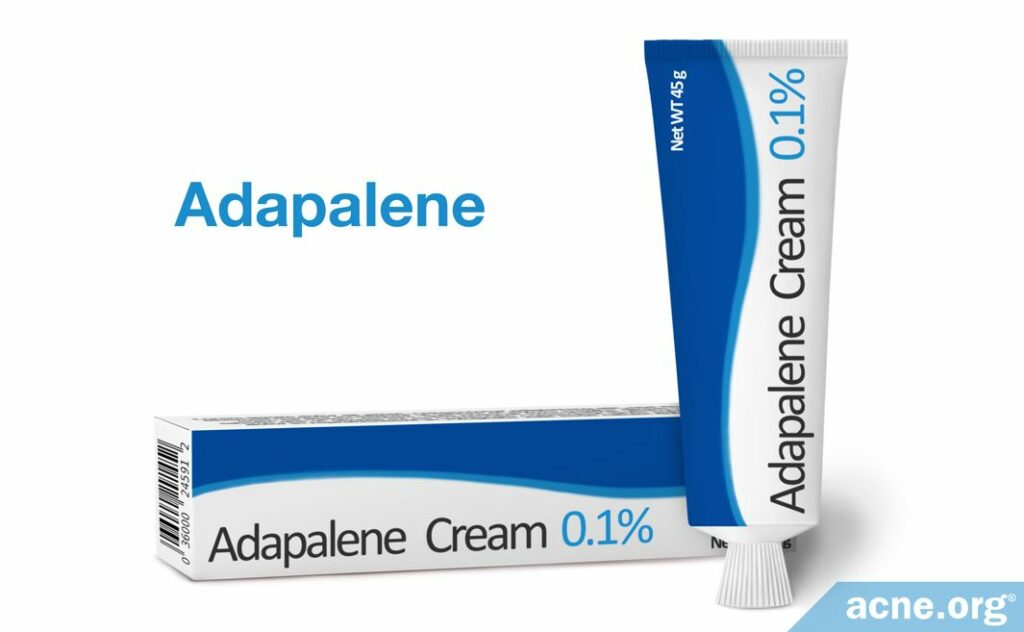
Studies have shown that when patients apply adapalene nightly for a period of 12 weeks, it results in an average reduction of 58% of non-inflammatory lesions, a 52% reduction of inflammatory lesions, and a 57% reduction in overall lesion counts.2
Tazarotene
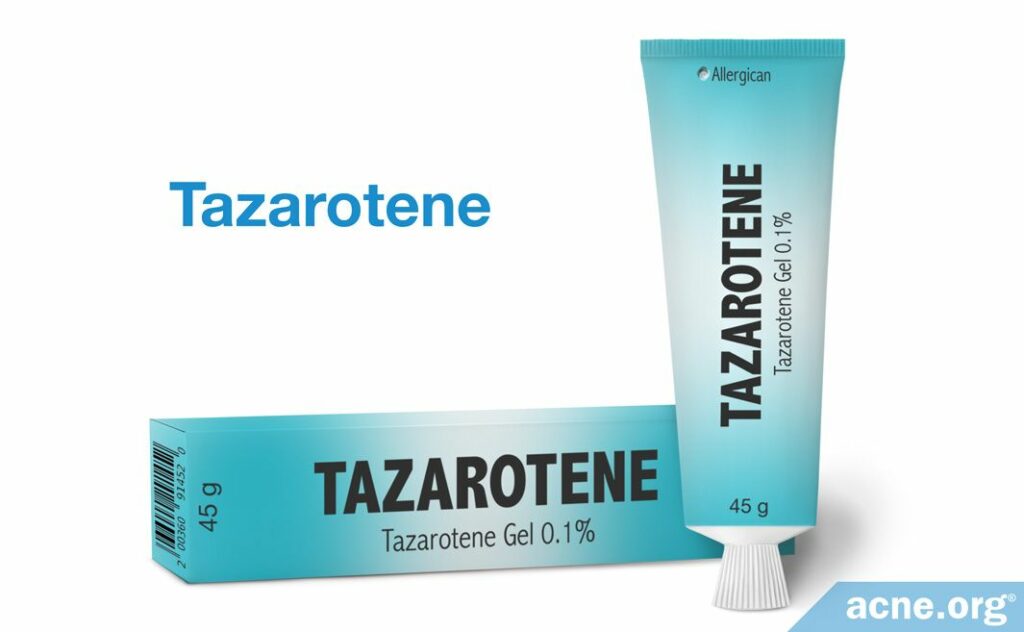
Studies have shown that when patients apply tazarotene nightly for a period of 12 weeks, it results in an average reduction of 45 – 55% of non-inflammatory lesions, a 39 – 42% reduction of inflammatory lesions, and a 44 – 52% reduction in total lesions.2
Trifarotene
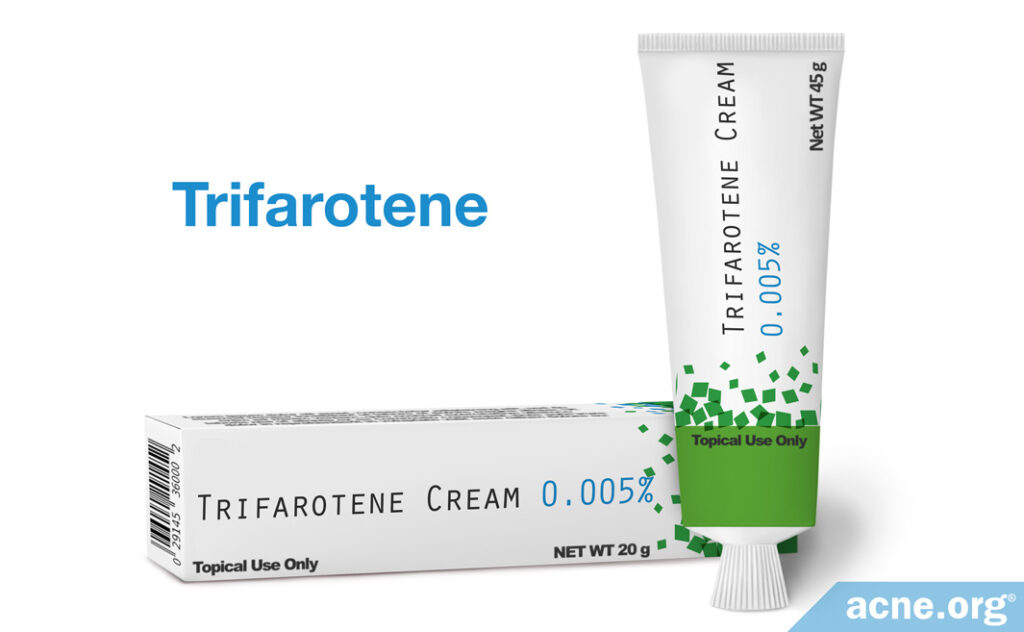
So far, two studies have shown that when patients apply trifarotene nightly for a period of 12 weeks, it results in an average reduction of 29-43% of facial inflammatory and non-inflammatory acne lesions and a 36-43% reduction of body acne lesions (the researchers did not specify whether the body acne lesions were inflammatory or non-inflammatory).9
Comparing tretinoin, adapalene, tazarotene, and trifarotene
Unfortunately, scientists have not performed studies that compare the effectiveness of all the retinoids in the treatment of acne. Therefore, we cannot draw a conclusion regarding which retinoid, or which retinoid concentration or vehicle, is most effective. However, some studies comparing pairs of retinoids have concluded that adapalene may be slightly more efficacious than tretinoin, and tazarotene is slightly more efficacious than adapalene in the treatment of acne.2,6,7,10
Combining retinoids and benzoyl peroxide
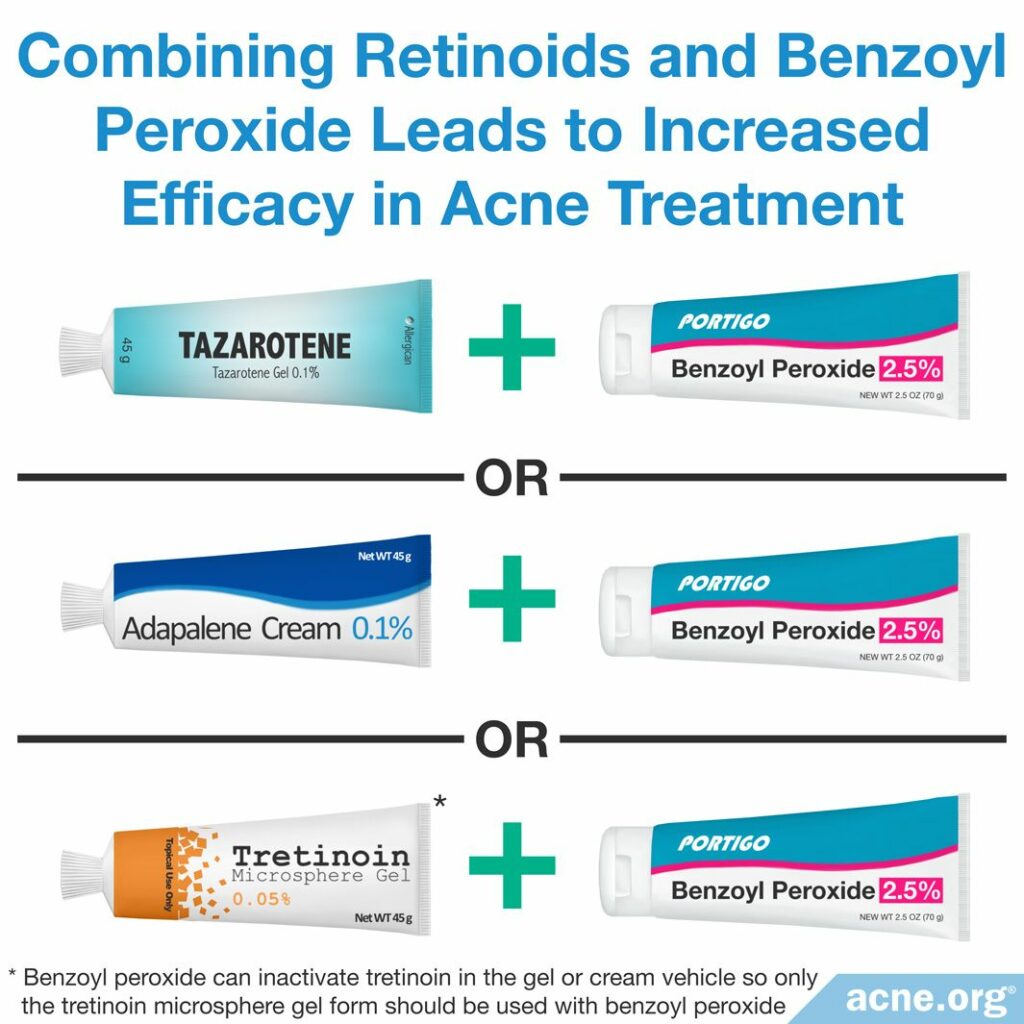
Acne medications that combine benzoyl peroxide with retinoids have shown increased efficacy in the treatment of acne. Adapalene, tazarotene, and tretinoin microsphere gel can be combined or applied alongside benzoyl peroxide for improved acne reduction. However, benzoyl peroxide can inactivate tretinoin in its usual cream or gel vehicle and, thus, acne patients should only use benzoyl peroxide with tretinoin’s microsphere gel formulation.2,6
Retinoid Side Effects
In addition to topical retinoids having slightly different efficacies in the treatment of acne, they also come with varying side effects.
Skin irritation
All retinoids are able to cause skin irritation, especially during the first two to four weeks of retinoid treatment, which disappears after two to three months of use. The most common forms of skin irritation include dryness, scaling, redness, and sensitivity to the sun.2,9
Research shows that four factors determine how much irritation a topical retinoid causes:
- Retinoid type: Studies comparing the tolerability of retinoids have found that patients tolerate adapalene the best, with tretinoin in second place, followed by tazarotene. As a newcomer to the market, trifarotene has yet to be tested against the other three retinoids.7,8
- Concentration: Higher concentrations are more likely to cause irritation.11
- Formulation: The amount of skin irritation may also depend on whether the medication is a cream, gel, foam, or lotion. We do not have enough information to say which of these might be least irritating, except that for patients using tazarotene, the cream vehicle is best tolerated.7,11-13
- Skin sensitivity: People with sensitive skin tend to experience more skin irritation from using topical retinoids than people with regular skin.11
Scientists have based these conclusions on 34 studies, each examining different concentrations and vehicles of the first three retinoids, tretinoin, adapalene, and tazarotene. While 13 studies showed significant differences in tolerability, 21 studies did not.7,13
I’ll just add my personal experience here. I have used tretinoin, adapalene, and tazarotene in the past. Tretinoin caused some irritation and discomfort for the first few weeks. Adapalene caused almost no irritation or discomfort. And tazarotene caused so much irritation and discomfort that I had to stop using it. It practically felt like my face was on fire. I am only one person, so this doesn’t mean you will react the same way, but just wanted to add in my real-life experience here.
Pregnancy
The FDA classifies adapalene and tretinoin as pregnancy category C drugs, which means animal studies have shown an adverse effect on the fetus, but medical professionals may still prescribe them when potential benefits outweigh potential risks. The FDA classifies tazarotene more severely, as a category X drug, which means the risks clearly outweigh the benefits and doctors should not prescribe it to women who are pregnant or who plan to become pregnant.14 Because trifarotene is a new drug, the FDA has yet to determine its pregnancy category,15 so it is best to avoid it if you are pregnant or planning to become pregnant.
Conclusion
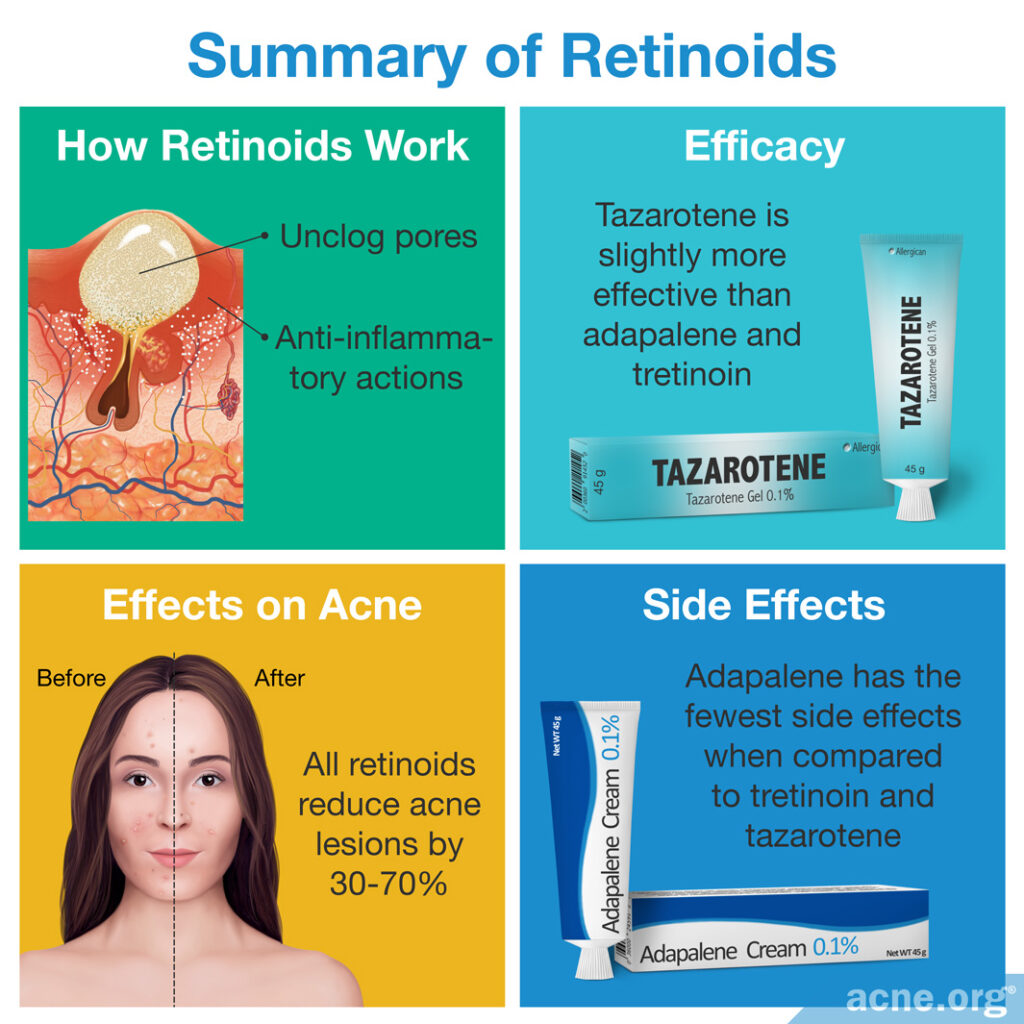
Tretinoin, adapalene, tazarotene, and the newly approved trifarotene work to treat mild to moderate acne by unclogging pores and possess anti-inflammatory properties. Some research has shown tazarotene to be slightly more effective than tretinoin or adapalene, but to potentially cause greater side effects. Adapalene appears to be the retinoid with the fewest side effects. Regardless of which retinoid is administered, reduction in acne is normally incomplete, yet significant, resulting in about 30 – 70% less acne.
References
- Shapiro, S. et al. Use of topical tretinoin and the development of noncutaneous adverse events: Evidence from a systematic review of the literature. J Am Acad Dermatol 65, 1194 – 1201 (2011). https://www.ncbi.nlm.nih.gov/pubmed/21550137
- Hsu, P., Litman, G. I., & Brodell, R. T. Overview of the treatment of acne vulgaris with topical retinoids. Postgrad Med 123, 153 – 61 (2011). https://www.ncbi.nlm.nih.gov/pubmed/21566426
- Sorg, O. & Saurat, J. H. Topical retinoids in skin aging: A focused update with reference to sun-induced epidermal vitamin a deficiency. Dermatology 228, 314 – 325 (2014). https://www.ncbi.nlm.nih.gov/pubmed/24821234
- Hubbard, B., Unger, J. G. & Rohrich, R. J. Reversal of skin aging with topical retinoids. Plast Reconstr Surg 133, 481e – 90e (2014). https://www.ncbi.nlm.nih.gov/pubmed/24675201
- Motamedi, M., Chehade, A., Sanghera, R. & Grewal, P. A clinician’s guide to topical retinoids. J Cutan Med Surg 26, 71-78 (2022). https://pubmed.ncbi.nlm.nih.gov/34292058/
- Zaenglein, A. L. et al. Guidelines of care for the management of acne vulgaris. J Am Acad Dermatol 74, 945 – 73 (2016). https://www.ncbi.nlm.nih.gov/pubmed/26897386
- Costa, C. S. & Bagatin, E. Evidence on acne therapy. Sao Paulo Med J 18, 193 – 197 (2013). https://www.ncbi.nlm.nih.gov/pubmed/23903269
- Kolli, S. S., Pecone, D., Pona, A., Cline, A. & Feldman, S. R. Topical retinoids in acne vulgaris: A systematic review. Am J Clin Dermatol 20, 345‐365 (2019). https://www.ncbi.nlm.nih.gov/pubmed/30674002
- Brumfiel, C. M., Patel, M. H., Bell, K. A. & Cardis, M. A. Assessing the safety and efficacy of trifarotene in the treatment of acne vulgaris. Ther Clin Risk Manag 26, 755-763 (2021). https://www.ncbi.nlm.nih.gov/pmc/articles/PMC8324978/
- Kakita, L. Tazarotene versus tretinoin or adapalene in the treatment of acne vulgaris. J Am Acad Dermatol 43, 51-54 (2000). https://pubmed.ncbi.nlm.nih.gov/10898831/
- Leyden, J., Stein-Gold, L. & Weiss, J. Why topical retinoids are mainstay of therapy for acne. Dermatol Ther (Heidelb) 7, 293‐304 (2017). https://www.ncbi.nlm.nih.gov/pubmed/28585191
- Latter, G., Grice, J. E., Mohammed, Y., Roberts, M. S. & Benson, H. A. E. Targeted topical delivery of retinoids in the management of acne vulgaris: Current formulations and novel delivery systems. Pharmaceutics 11, 490 (2019). https://www.ncbi.nlm.nih.gov/pubmed/31554188
- Culp, L. et al. Tolerability of Topical Retinoids: Are There Clinically Meaningful Differences Among Topical Retinoids? J Cutan Med Surg 19, 530 – 538 (2015). https://www.ncbi.nlm.nih.gov/pubmed/26088502
- Chien, A. L. et al. Treatment of Acne in Pregnancy. J Am Board Fam Med 29, 254 – 262 (2016). https://www.ncbi.nlm.nih.gov/pubmed/26957383
- Drugs.com: Trifarotene topical Pregnancy and Breastfeeding Warnings; www.drugs.com/pregnancy/trifarotene-topical.html
 Acne.org Products
Acne.org Products